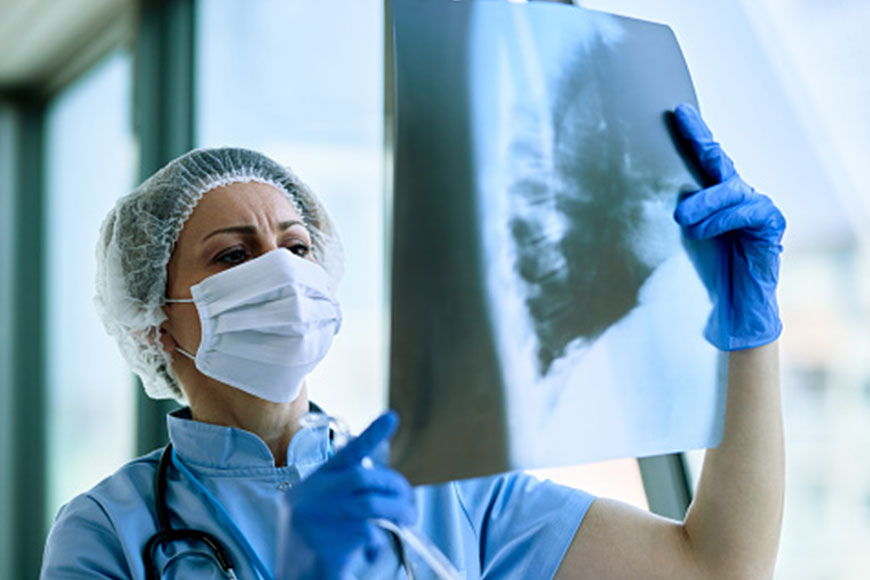What is pneumonia?
Pneumonia is a contamination of one or the two lungs brought about by microbes, infections or organisms.
At the point when there is a disease in the lungs, a few things occur, including:
- Your airway swells (becomes inflamed)
- The air sacs in the lungs are filled with mucus and other fluids

How do the lungs work?
The main job of your lungs is to get oxygen into your blood and remove carbon dioxide. This happens during breathing. You breathe 12 to 20 times a minute when you’re not sick. The trachea is divided into airways (bronchial tubes). One of the bronchial tubes leads to the left lung and the other to the right lung. For the lungs to perform best, the airways must be open during inhalation and exhalation. Swelling (inflammation) and mucus can make it difficult to move air through the airways, making breathing more difficult. This leads to shortness of breath, difficulty breathing and feeling more tired than usual.
How common is pneumonia?
Nearly one million adults in the United States are hospitalized each year with pneumonia and 50,000 people die from the disease. This is the second most common reason for hospitalization – childbirth is the first. Pneumonia is the most common cause of hospitalization for children in the United States. Older adults who are hospitalized with pneumonia have a higher risk of death than any of the other 10 causes of hospitalization.
Is pneumonia contagious?
Certain types of pneumonia are contagious (passed from person to person). Pneumonia caused by bacteria or viruses can be contagious when disease-carrying organisms are inhaled into your lungs. However, not everyone who is exposed to the pneumonia-causing germs gets it.
Pneumonia caused by fungi is not contagious. The fungi are in the soil, airborne and inhaled, but they are not transmitted from person to person.
How pneumonia is communicated starting with one individual then onto the next?
Pneumonia is spread when droplets of fluid containing pneumonia bacteria or virus are released into the air when someone coughs or sneezes and then others inhale it. You can also get pneumonia from touching an object that a person with pneumonia has touched (the transmission of germs) or a tissue used by the infected person and then touching your mouth or nose.
How long will I be contagious if I have pneumonia?
If you have bacterial pneumonia, it is still considered contagious until about the second day after you start taking the antibiotics and you no longer has a fever (if you have one). If you have viral pneumonia, you will remain contagious until you feel better and have a fever for several days.
In adults, what are the signs and symptoms of bacterial versus viral pneumonia?
Indications of pneumonia can go from gentle (cold or influenza like manifestations) once in a while called “versatile pneumonia” to serious. The severity of your pneumonia depends on the specific germ causing the pneumonia, your general health, and your age.
Bacterial pneumonia: Symptoms of bacterial pneumonia can grow progressively or unexpectedly. Symptoms include:
- A high temperature (up to 105 degrees Fahrenheit)
- fatigue (tiredness)
- Difficulty breathing: fast breathing or windedness
- perspiring
- Goosebumps
- Mucus cough (may be greenish or contain a small amount of blood)
- Chest and/or abdominal pain, especially with coughing or deep breathing
- Anorexia
- Confused mental state or changes in consciousness (especially in older adults)
Viral pneumonia: Symptoms usually appear over several days. Early symptoms are similar to those of the flu, which include:
- Fever
- dry cough
- Headache
- sore throat
- Anorexia
- muscle pain
- weakness
Additional symptoms that appear after about a day include:
- high temperature
- coughing with mucus
- Shortness of breath
How can I tell if I have pneumonia versus a cold or the flu?
It’s hard to tell the difference but it’s important to know when to seek medical care
Pay attention to these persistent symptoms that occur in pneumonia:
- severe congestion or chest pain
- Breathing difficulties
- Fever of 102 or higher
- Cough that produces pus
Pneumonia symptoms last longer than cold and flu. If your symptoms are not severe, it is okay to try home remedies such as getting more rest, drinking more fluids, taking some over-the-counter medications and seeing what happens. But if you don’t notice an improvement in your symptoms after three to five days, or if you develop more serious symptoms such as dizziness or severe difficulty breathing, see your healthcare provider. do not let her go. Pneumonia; like symptoms in very young children or adults older than 65 are a cause for concern. Also, pneumonia can cause permanent lung damage if left untreated for a long time. And always seek immediate care if you have chest pain or difficulty breathing.

